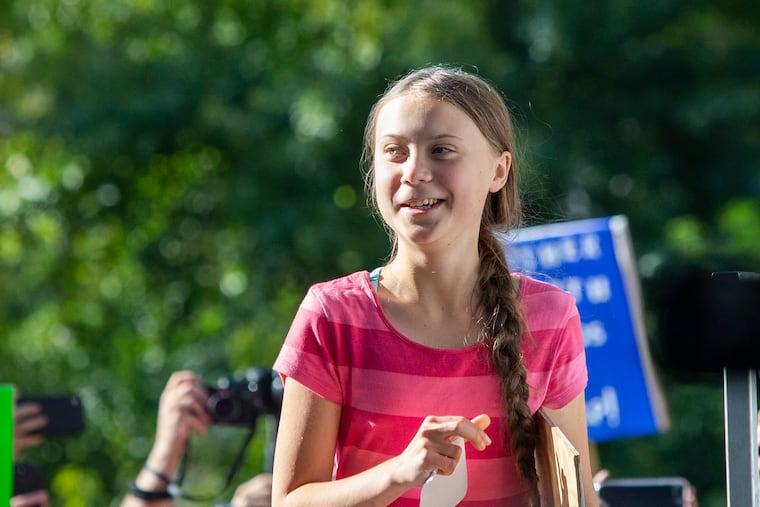Greta Thunberg knows how adults disenfranchise children and is outsmarting us | Opinion
Arguing that Thunberg is incapable of having her own worldview is perhaps an attempt to restore the childhood she said was stolen from her. But that carbon neutral yacht has sailed.

Sixteen-year-old climate change activist Greta Thunberg has faced criticism for practically everything but her stance on the environment. Adult climate deniers have called her arrogant, petulant, and a puppet. Some have called her mentally ill (she has Asperger’s, which is not a mental illness). One adult called her a drama queen and another compared her to Children of the Corn. The Leader of the Free (Adult) World mocked her on Twitter.
Some critics are kinder, asking fellow adults to see Thunberg as a victim of abuse or political maneuverings. Even when such arguments are framed as calls to protect Thunberg, what they’re really doing is dismissing young people as unable to understand the world and participate in grown-up conversations. As one adult argued: When children protest, adults should correct them.
I’ve spent most of my adult life (and many, many years of graduate school, including a Ph.D. in childhood studies at Rutgers-Camden) trying to understand childhood. With that comes trying to understand how adults think about children and childhood.
Sometimes children do get used by adults for political purposes. Five-year-old Elián González, who was found floating off the coast of Florida en route from Cuba in 1999, is one example. He didn’t intentionally come to the United States to spark discussion about immigration and American-Cuban relations. Nor was he ever truly allowed to be a person with a voice and personality. He became a character in a politicized custody battle across international borders. González was lucky enough to at least be known by name, which children separated from their families at the U.S.-Mexico border have been denied. We don’t hear their names, their voices, how they feel, or what they think.
Children used as pawns are denied humanity by the adults telling their stories, which makes it easier for adults to infuse them with ideology.
Thunberg is not these children.
One of the greatest adult sins is thinking children have no stakes in a situation and don’t deserve a seat at the table. The dismissal of Thunberg’s agency is the status quo. Keeping children in their place makes adults feel good, as if: Everything is fine, nothing to worry about here. The kids are alright — under our authority and protection. Arguing that Thunberg is incapable of having her own worldview is perhaps an attempt to restore the childhood she said was stolen from her. But that carbon neutral yacht has sailed.
Instead, Thunberg pulled up her own chair to the table, pushed some adults aside, and made herself clear: I have something to say. She did it first with her family, convincing them to lower their carbon footprint. Inspired by the Parkland students, Thunberg organized student-led strikes against climate change.
Thunberg’s message has always been twofold: Climate change is the greatest threat to human existence, and although adults are responsible for fixing it, they have ignored it instead. In 2018, she stood outside the Swedish Parliament with a sign castigating adults for their inaction. Over and over again, she faces rooms of adults and calls them liars, scolds their greed, calls out empty promises, and demands that she — and all children — be listened to. She’s not just some character in a story adults are telling; she’s the author.
When you read or hear her words, it’s clear that Thunberg — as the Parkland students, Malala Yousafzai, Jennifer Keelan, whose actions helped spur the Americans with Disabilities Act, and thousands of black children who marched against segregation in 1963 — understands how adults perceive children: as passive and dependent, blank slates to be written on. In that view, children should only speak when spoken to and, if they do speak out, it’s just adults’ puppetry.
Thunberg is so skillful and passionate she uses this perception to her advantage. She leverages our romantic ideas about childhood to trigger our natural response to save them, framing herself as a child whom adults have failed. But — key to her message — Thunberg doesn’t see conflict between two groups of adults (like ones in U.S. and Cuba,) but between all adults and the future, which belongs to children.
In unique and complicated ways, children, especially from marginalized groups, are one of the world’s most silenced demographics. We talk a lot about children, but rarely let them talk for themselves. In a time when much of the public wants to lift up underrepresented voices and give them equity previously denied, why would we stifle children’s voices? Especially when they make so much sense.
Matthew Prickett teaches in the American Studies program at Rowan University. prickettmb@gmail.com